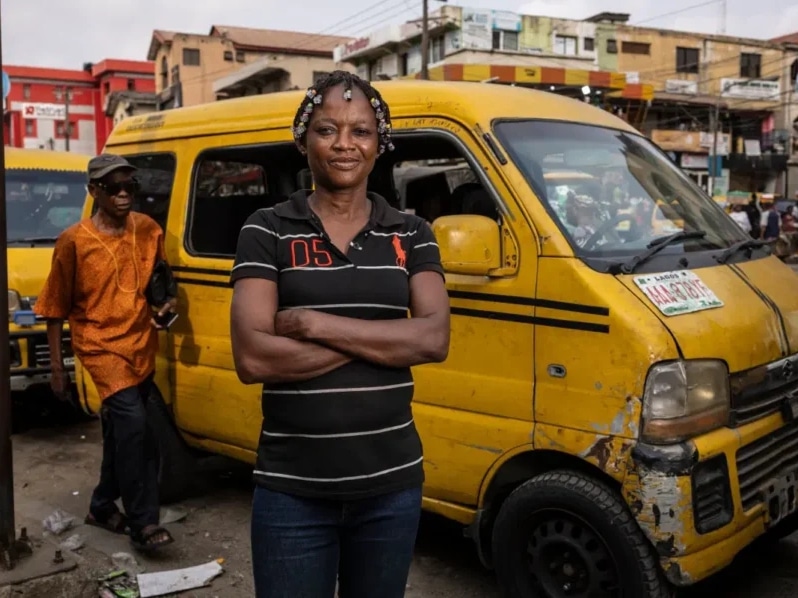
Nigerian women are breaking barriers in commercial driving, challenging gender norms while navigating economic hardships and societal expectations. (photograph: Theguardian/NAN
Amaka Okoli, a former banker, never imagined she would become a commercial bus driver in Lagos.
But after losing her job three years ago, she found herself navigating the city’s chaotic transit system, juggling her role as a mother of three with the demanding job of a bus driver.
Starting her day at 5:30 a.m. to capitalize on the morning rush, Okoli works through the afternoon before returning home to her family.
Once a rarity, female commercial drivers like her are now becoming a more common sight in Nigeria’s economic capital.
“It was rare to see a female commercial driver in Lagos, but things are changing because we need to survive,” she told AFP.
Okoli took up driving a year before Nigeria plunged into its worst economic crisis in decades. As living costs soared due to government reforms, many women entered traditionally male-dominated professions to support their families.
“I feel like I live two lives—one as a driver where I have to be bold, and another as a homemaker caring for my family,” she said.
Navigating the Chaos of Lagos’ Transport System as a Female Commercial Bus Driver
Driving in Lagos is not for the faint-hearted. The city’s privately operated minibuses, known as “Danfo” or “Korope,” transport millions daily, with drivers and conductors aggressively calling out to passengers in a battle for fares.
“Being aggressive is part of the job,” Okoli explained. “Other drivers will try to cheat you, or road users will doubt you because you’re a woman.”
The sector also grapples with concerns over reckless driving and alcohol consumption. According to Nigeria’s Federal Road Safety Corps, speed violations caused 56% of road accidents in the first half of 2024.
Authorities continue to crack down on drunk driving, yet enforcement remains inconsistent.
Despite these challenges, female drivers are gaining a reputation for being more careful and maintaining cleaner vehicles.
“Passengers now prefer female drivers because they believe we are more responsible on the road,” Okoli said.
Economic Hardships Push Women into Male-Dominated Roles
Experts link the rise of female commercial drivers to Nigeria’s ongoing economic struggles.
The removal of petrol subsidies and currency devaluation have drastically increased the cost of living, forcing more women to become primary breadwinners.
“Families can no longer survive on a single income. In many cases, women have taken on roles traditionally assigned to men,” said Samuel Odewumi, a professor of transport planning at Lagos State University.
Recognizing this shift, Lagos state authorities have reserved 20% of public mass transit driving roles for women.
Beyond buses, more women are also entering the e-hailing industry, registering their own vehicles with ride-hailing platforms like Uber and Bolt.
Solidarity Among Women Drivers
Victoria Oyeyemi, president of the Ladies on Wheels Association of Nigeria (LOWAN), has witnessed this transformation firsthand. Founded in 2018 with just six members, the group now boasts over 5,000 female drivers.
“We realized we needed to support each other, especially in a busy city like Lagos,” Oyeyemi said.
LOWAN advises members to avoid working late hours to reduce the risk of robbery. The group also fosters a strong sense of community, exchanging job opportunities and pooling savings to help members cover significant expenses, such as school fees.
The Financial Realities of the Job
Despite the growing presence of women in commercial driving, financial struggles remain. Okoli, like many others, faces steep operational costs, from fuel expenses to paying fines—or bribes—to traffic wardens.
After these deductions, she estimates taking home only 40% of her earnings.
“The job is physically and mentally demanding, and I can only make seven trips a day,” she admitted. “The income isn’t enough to meet all my needs, but it’s better than being unemployed.”
Also Read:Nigerian Senate Suspends Senator Natasha Akpoti-Uduaghan Over Alleged Rule Violations
As more Nigerian women step behind the wheel, their presence signals a shift in societal norms, proving that economic necessity is reshaping traditional gender roles in unexpected ways.






